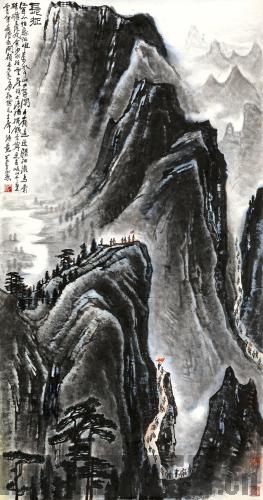|
|

|
|
INVESTMENT: Chinese artwork is fetching millions (Xinhua) |
China's art market is on fire. As sales and prices break records, a new force has appeared in the market - organized art finance in the form of art trust funds and artwork exchanges.
It was reported that the anonymous winner of the bid for the Song Dynasty calligraphy work Dizhuming by Huang Tingjian (1045-1105), which was sold for a staggering 436.8 million yuan ($68.25 million) in Beijing last year, sought financing from an art trust fund to make the payment.
The art financing case surfaced because the trust fund, Jilin Province Trust Co. Ltd., issued a trust investment product for a period of two years three months later to raise 450 million yuan. Dizhuming was announced as the pledge for the fund-raising.
Another form of art financing—artwork exchanges, have sprouted in many cities since 2009. The new art trading model was introduced to the Chinese art market after the Shanghai Culture Assets and Equity Exchange opened for business on June 15, 2009. The exchange is the country's first comprehensive artwork exchange.
Since then a number of similar exchanges have been set up. In June 2011, 20 art stock exchanges were operating in China. Extraordinarily by September 2011, just three months later, another 14 artwork exchanges had opened or were being established.
Some exchanges, like the Shanghai Exchange, engage in a range of art related business from art property rights transactions and artwork investment and financing, to art stock trading. Other exchanges, like those based in Tianjin Municipality and Zhengzhou in Henan Province, focus only on art shares.
This has given rise to concerns about the growing incidence of fraud in an immature art finance market that lacks a complete set of regulations and standards.
However, works of art have been freely traded in China for almost 20 years and the art market has developed rapidly in the past decade.
With sales surpassing 50 billion yuan ($ 7.7 billion), China overtook the United States to become the world's largest art market in 2010. China now accounts for 33 percent of the global art market, according to a report from Guangming Daily.
As China's art market continues to flourish the manner in which art is sold and traded in China has begun to change.
Artwork stock exchanges are an innovation that combines cultural property with financial tools. "Trading in artwork shares is a form of asset securitization," said Lei Yuan, a professor with Peking University and also an inventor of the artwork stock exchange concept.
Artwork stock exchanges, as a trading platform, have the following basic functions: identifying and evaluating artworks, establishing property rights for artworks, releasing and trading artworks and registering the trusteeship of artworks.
However as the number of such exchanges has grown problems with their business model have become evident.
No independent agencies or organizations are responsible for verifying the authenticity of artwork. Fake works were still plaguing China's primary and secondary art markets.
"The lack of authentication means that investors face huge risks," said Li Xiaolei, Deputy Director of the Culture Industry Department under the Ministry of Culture.
Crucially, artwork stock exchanges should ensure that the artworks they trade are real and legal.
Before trading, the objective value of the artwork should be scientifically appraised by authentic organizations made up of independent artistic and economic professionals, Li said.
The trading process also demands examination and supervision from the relevant administrative departments.
"A national law should also be drafted to regulate listings of artworks on exchanges where their shares are traded," he said. "Because artwork exchanges combine both culture and finance, they need to be regulated by the government."
At present China's art market is effectively unregulated and artwork exchanges lack policy support, industry standards and credit guarantees.
"Artwork stock trading, in theory, is the most scientific and highest form of art transactions. However, efforts are needed to help establish standards for the business," said Zhou Yongjin, Director of the Culture Department of Hunan Province.
From the perspective of developing the national economy, artwork stock exchanges are very necessary. "Artwork exchanges can absorb excessive hot money which flows into China and causes inflation, in addition they can help the art market grow and diversify," Zhou said.
"While it is not easy to foster an incipient market, killing such a market is relatively easy, and, therefore, any moves to regulate the current system must be made with care," he said.
|